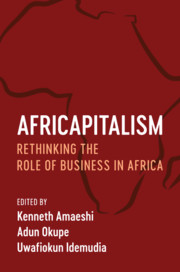This guide is intended for students and researchers studying Business in Africa at the University of Oxford, although students and researchers from any field may find it useful.
Use this guide to find out about books and online resources about Business in Africa, including ebooks, ejournals and databases.
 Africapitalism: Rethinking the Role of Business in Africa
by
Africa is on the rise. Enabled by natural resources, commodity trading and the recent discovery of Africa as the last frontier of capitalism by the global market, African entrepreneurs are now being empowered as economic change agents. How can this new economic elite engage in the sustainable development of the continent? 'Africapitalism', the term coined by Nigerian economist Tony O. Elumelu, describes an economic philosophy embodying the private sector's commitment to the economic transformation of Africa through investments generating economic prosperity and social wealth. The concept has attracted significant attention in both business and policy circles. Promoting a positive change in approach and outlook towards development in Africa, this book consolidates research and insights into the Africapitalism movement, and will appeal to scholars, researchers and graduate students of Africa studies, international business, business and society, corporate social responsibility, strategic management, economic thought, international political economy, leadership and development studies.
Africapitalism: Rethinking the Role of Business in Africa
by
Africa is on the rise. Enabled by natural resources, commodity trading and the recent discovery of Africa as the last frontier of capitalism by the global market, African entrepreneurs are now being empowered as economic change agents. How can this new economic elite engage in the sustainable development of the continent? 'Africapitalism', the term coined by Nigerian economist Tony O. Elumelu, describes an economic philosophy embodying the private sector's commitment to the economic transformation of Africa through investments generating economic prosperity and social wealth. The concept has attracted significant attention in both business and policy circles. Promoting a positive change in approach and outlook towards development in Africa, this book consolidates research and insights into the Africapitalism movement, and will appeal to scholars, researchers and graduate students of Africa studies, international business, business and society, corporate social responsibility, strategic management, economic thought, international political economy, leadership and development studies.
 Africapitalism: Sustainable business and development in Africa
by
Africapitalism: Sustainable business and development in Africa
by
 Enterprising Women: Expanding Economic Opportunities in Africa
by
This book brings together new household and enterprise data from 41 countries in Sub-Saharan Africa to inform policy makers and practitioners on ways to expand women entrepreneurs' economic opportunities. Sub-Saharan Africa boasts the highest share of women entrepreneurs, but they are disproportionately concentrated among the self-employed rather than employers. Relative to men, women are pursuing lower opportunity activities, with their enterprises more likely to be smaller, informal, and in low value-added lines of business. The challenge in expanding opportunities is not helping more women become entrepreneurs but enabling them to shift to higher return activities. A central question addressed in the book is what explains the gender sorting in the types of enterprises that women and men run? The analysis shows that many Sub-Saharan countries present a challenging environment for women. Four key areas of the agenda for expanding women's economic opportunities in Africa are analyzed: strengthening women's property rights and their ability to control assets; improving women's access to finance; building human capital in business skills and networks; and strengthening women's voices in business environment reform. These areas are important both because they have wide gender gaps and because they help explain gender differences in entrepreneurial activities. It is particularly striking that while gender gaps in education tend to close with higher incomes, gaps in women's property rights and in women's participation in reform processes do not. As simply raising a country's income is unlikely to be sufficient to give women equal ability to control assets or have greater voice, more proactive steps will be needed. Practical guidelines to move the agenda forward are discussed for each of these key areas.
Enterprising Women: Expanding Economic Opportunities in Africa
by
This book brings together new household and enterprise data from 41 countries in Sub-Saharan Africa to inform policy makers and practitioners on ways to expand women entrepreneurs' economic opportunities. Sub-Saharan Africa boasts the highest share of women entrepreneurs, but they are disproportionately concentrated among the self-employed rather than employers. Relative to men, women are pursuing lower opportunity activities, with their enterprises more likely to be smaller, informal, and in low value-added lines of business. The challenge in expanding opportunities is not helping more women become entrepreneurs but enabling them to shift to higher return activities. A central question addressed in the book is what explains the gender sorting in the types of enterprises that women and men run? The analysis shows that many Sub-Saharan countries present a challenging environment for women. Four key areas of the agenda for expanding women's economic opportunities in Africa are analyzed: strengthening women's property rights and their ability to control assets; improving women's access to finance; building human capital in business skills and networks; and strengthening women's voices in business environment reform. These areas are important both because they have wide gender gaps and because they help explain gender differences in entrepreneurial activities. It is particularly striking that while gender gaps in education tend to close with higher incomes, gaps in women's property rights and in women's participation in reform processes do not. As simply raising a country's income is unlikely to be sufficient to give women equal ability to control assets or have greater voice, more proactive steps will be needed. Practical guidelines to move the agenda forward are discussed for each of these key areas.